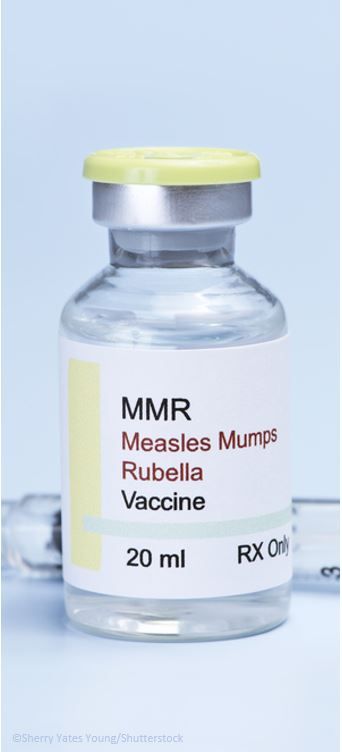- Clinical Technology
- Adult Immunization
- Hepatology
- Pediatric Immunization
- Screening
- Psychiatry
- Allergy
- Women's Health
- Cardiology
- Pediatrics
- Dermatology
- Endocrinology
- Pain Management
- Gastroenterology
- Infectious Disease
- Obesity Medicine
- Rheumatology
- Nephrology
- Neurology
- Pulmonology
IDWeek 2023: Measles and Rubella Antibodies Persist in Adults after 3 MMR Doses, but Measles Susceptibility May Linger
This article is part of our IDWeek 2023 coverage. You can find all of our news here.
In a new study of adults who received 3 doses of measles-mumps-rubella (MMR) vaccine, measles antibody levels declined over time, while rubella antibody levels remained stable and protective.
©Sherry Yates Young/Shutterstock.com

The findings also suggest that there is a potential risk of susceptibility to measles infection in some adults over time despite receiving the third MMR dose.
The study abstract is being presented during a poster session at IDWeek 2023, being held from October 11-15 in Boston, MA.
A third dose of the MMR vaccine “may be administered for various reasons, but there are limited data on long-term immunogenicity,” wrote presenting author Oluwakemi Alonge, MPH, epidemiologist, Marshfield Clinic Research Institute, Wisconsin, and colleagues. “We assessed persistence of measles and rubella neutralizing antibodies among adults after receipt of three MMR doses.”
According to the abstract, a cohort of adults who received 2 MMR doses in childhood and a third dose as young adults (aged 18-28 years) in 2009-2010 were recontacted at approximately 5 years (2014-2016) and 9-11 years (2019-2021) after receiving athird MMR dose.
“Measles and rubella antibody levels were assessed by plaque-reduction and soluble immunocolorimetric neutralization assays, respectively,” wrote investigators in the methods section of the abstract.
At the follow-up assessments, participants were considered potentially susceptible to infection if they had measles antibody concentrations <120 mIU/mL or rubella antibody concentrations <10 U/mL. Researchers used generalized estimating equations models to “estimate geometric mean concentrations (GMC) and 95% confidence intervals (CI) of antibody levels over time.”
FINDINGS
Approximately 5 and 9-11 years after receiving a third MMR dose, 408 adults (aged 22-33 years) and 304 adults (aged 26-37 years) were reassessed, respectively, according to the abstract.
Measles antibody levels. Approximately 5 years after the third MMR dose, the GMC for measles was 428 mIU/mL (95% CI, 392–468 mIU/mL) and declined to 381 mIU/mL (95% CI, 339 – 428 mIU/mL) at 11 years. Measles antibody concentrations during both long-term follow-up periods declined to levels lower than those observed before the receipt of the third MMR dose.
At the last follow-up visit (2019-2021), 10% of participants were potentially susceptible to measles infection, compared to 3% before receiving the third MMR dose up to 11 years earlier, observed investigators.
Rubella antibody levels. For rubella, Alonge and coauthors noted GMCs remained stable throughout the long-term follow-up period, ranging from 63 U/mL to 65 U/mL. Rubella antibody concentrations during the long-term follow-up periods remained higher than levels observed before the receipt of the third MMR dose and were similar to levels observed at 1 year after receiving the third dose.
None of the participants were susceptible to rubella at the last follow-up visit, added authors.
“Neutralizing antibody levels to measles and rubella remained high and persisted through 11 years after vaccination among adults who received three MMR doses. However, some adults may become susceptible to measles infection over time despite receipt of three MMR doses,” concluded Alonge et al.
Source: Long-term persistence of measles and rubella virus neutralizing antibody levels among adults with three doses of measles-mumps-rubella vaccine. Abstract presented at IDWeek; October 11-15, 2023; Boston, MA.
